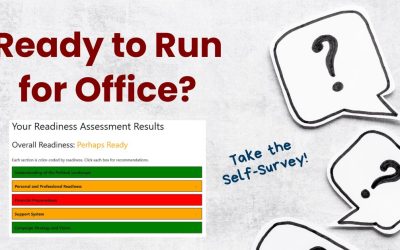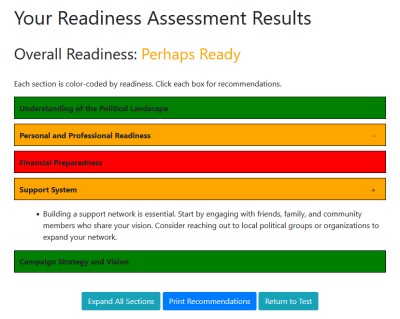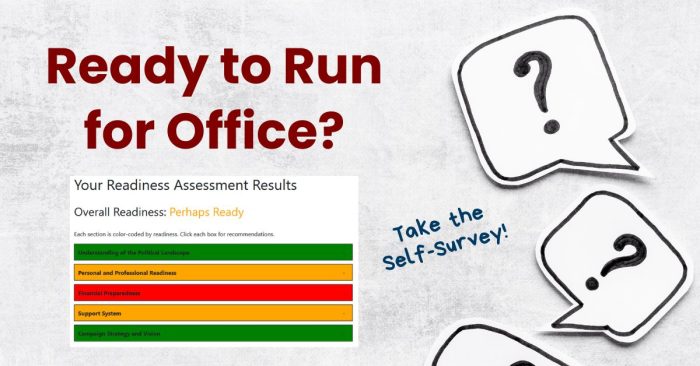Don’t Let Weak Copy Undercut Your Political Campaign
When you’re running for local office, it’s easy to think that words are the easy part. After all, you already know your values, your community, and what you stand for. Why not just write it yourself?
But here’s the truth: the words on your campaign website, print materials, and social posts are your first impression. And when you’re up against limited resources and low name recognition, your copywriting has to work overtime.
Who’s Writing Your Political Campaign Content?
In many small or down-ballot campaigns, the answer is: you. Or maybe a friend, a spouse, or a volunteer with a knack for writing. That’s completely normal, and often necessary. Even if you’re writing your own campaign messaging, the goal should be to make your message clear, focused, and voter-friendly.
You don’t need to sound like a political consultant. But you do need to sound like someone who’s ready to lead—and connect with voters.
Who’s Editing Your Campaign Materials?
Editing goes beyond just finding typos and grammatical errors. You want to make sure that your campaign copywriting:
- Gets to the point
- Uses plain, persuasive language
- Doesn’t ramble or confuse the reader
- Ends with a clear call to action (donate, volunteer, share)
If you can, have someone else read your drafts. Ask: “Does this sound like a leader?” “Would this make someone want to support me?” Bonus points if that person isn’t already on your team.
Do You Need to Write Like a Pro?
Not necessarily. But the goal is to make sure your campaign content does its job, no matter what form it takes. Whether it’s explaining your platform, introducing you to voters, creating voter outreach materials, or getting someone to take action, good political writing helps you:
- Tell your story clearly
- Explain your priorities and platform summary
- Earn credibility
- Build trust with voters
You don’t have to be flashy. But you do need to be understandable and consistent across platforms. That might mean hiring a political writer, working with a professional campaign writer, or simply getting some help shaping your message to make sure it resonates with your target voters.
If you’re writing it all yourself, and you find yourself staring at a blank screen or rewriting the same paragraph five times, you’re not alone.
Writing a Candidate Bio That Feels Real
Your candidate biography is often one of the first things voters read, so you don’t want to mess it up.
The best bios don’t try to sound like a resume. (You’d be surprised how many resumes we get as ‘About the Candidate’ content.) Instead, your bio should briefly explain who you are, why you’re running, and what values guide you. Keep it conversational, relevant to your race, and easy to follow.
Whether you’re running for city council, school board, or a county-level position, your bio should reflect how you’ve shown up for your community, and how you plan to keep doing so.
It should sound like you, just a more polished version. You might be struggling to find the right words to describe yourself, but take your time. Focus on shaping your story, tightening your message, and polishing your copy until it sounds clear and confident. Write both a full-length version and a one-sentence version you can reuse. And remember: this bio will be used again and again—on your website, social media, and print materials—so it’s worth getting right.
Tip: Write your bio in third person, but make sure it still sounds personal.

Explaining Where You Stand on the Issues
For many voters, issue pages are where they look to decide whether you’re worth supporting. But candidates often overthink them—or skip them entirely.
You don’t need to cover every topic. Focus on the three to five key issues that matter most to your community and are relevant to the office you’re running for. Keep each explanation short, specific, and in plain English.
You’re not writing a thesis on each issue (this means you, judicial candidates!). Instead, show that you understand the problem and have a reasonable approach to solving it.
Whether you’re writing your own materials or working with a freelance campaign copywriter, the message still needs to reflect your unique voice and priorities.
Tip: End each issue section with a line about why it matters to voters, not just to you.
Why It Matters for Local Candidates
Your opponent might have name recognition, but you might not. But your campaign website content, social posts, and mailers are your chance to catch up.
When voters search for you, what will they find? A blank Facebook page, or a site with your story, your platform, and a way to help?
Great writing builds trust. It helps people understand what you stand for. And it shows that you’re serious—even if you’re just getting started.
What You Say—and How You Say It—Matters
If you’re writing your own content, take the time to do it right. Focus on clarity, credibility, and connection.
Good copy doesn’t need to be fancy. It just needs to work.
? Online Candidate offers affordable copy editing services for political campaigns—from proofreading to complete rewrites. Whether you’re building your first campaign website or polishing a mailer, we’ll help you say what you mean and say it well.
Are You Ready for a Political Campaign? Take the Survey and Find Out!
We’re excited to introduce our latest tool: “Ready to Run for Office? Self-Assessment Survey.” This tool is for aspiring politicians and campaign trailblazers. It’s here to help you assess if you are ready to launch and run a successful political campaign.
This interactive survey covers various aspects of campaigning, from understanding the political landscape to gauging your personal and financial readiness. It’s straightforward and insightful, designed to make you think critically about your overall readiness. All you need to do is answer yes, no, or maybe for each question.
After completing the survey, you’ll receive personalized recommendations. These tips are geared towards strengthening your campaign strategy and addressing any gaps in your preparation.
The survey doesn’t ask for or save any personal information.
So, take a moment to check out the tool. Let us know what you think!
Free Tool: Run for Office Self-Assessment Survey
Sample Follow-Up Political Fundraising Letter
Not everyone donates to your political campaign the first time you ask—and that’s normal.
Many supporters will see your first fundraising email or letter and intend to donate, but they get distracted, busy, or wait for a better time. A well-timed follow-up gives them another chance to follow through.
If you think sending another message feels too aggressive, don’t. Second asks are not only common—they often perform better than your original appeal.
Below is a sample follow-up fundraising letter, along with guidance on when to use it, how to customize it, and why follow-ups work across all levels of campaigning.
Why One Ask Isn’t Enough in Political Fundraising
Most campaigns operate on tight timelines. But your supporters? They’re juggling daily life, work, and dozens of messages competing for attention.
Here’s why a follow-up is essential:
- Repetition builds awareness. Many voters need to see your message more than once before they act.
- Timing varies. Someone may not be ready to donate the first time—but might be a week later.
- Reminders increase results. Political campaigns that send follow-ups consistently see better response rates by the second and third ask.
- It reinforces professionalism. Following up shows you’re organized and serious about earning support.
Although it may feel like following up again is overkill, it’s not. It’s a standard, necessary part of a smart campaign fundraising.
Sample Follow-Up Fundraising Letter
Dear [First Name],
Last week, I reached out to ask for your support as I launch my campaign for [Office] in [Town/District]. If you’ve already made a contribution—thank you. If not, I wanted to follow up and ask again.
Every donation helps us reach more voters and build momentum. With just [X] weeks until early voting begins, now is a great time to invest in local leadership that listens and delivers.
Whether it’s $25, $100, or more—your support will make a real difference.
You can donate securely at [Campaign Website] or by mail to [Mailing Address].
Thank you for being part of this campaign and for believing in what we’re building together.
Sincerely,
[Candidate Name]
[Phone Number] | [Email Address] | [Website URL]
When to Send a Follow-Up Ask
Send your follow-up letter about 7 to 10 days after your original fundraising message. That window allows people to catch up—but keeps your campaign top of mind.
This format works well for:
- Email reminders to your supporter list
- Printed letters or postcards to previous non-responders
- Direct messages via online fundraising platforms
You can reuse much of the original content, but revise the message slightly to reflect the timing, urgency, or new campaign activity.
How to Make Your Follow-Up Letter More Effective
Sending a second message shouldn’t just repeat your first request. You want all your messaging to be timely, relevant, and strategic. So, keep these tips in mind:
- Reference the earlier message. Make it clear this is a follow-up, not a fresh solicitation.
- Include a time-sensitive hook. Tie the ask to an upcoming deadline, event, or fundraising milestone. Create some urgency.
- Keep it shorter than the first. A concise message respects the reader’s time and is more likely to be fully read.
- Thank existing donors. Include a note acknowledging those who may have already contributed. Don’t contact them as if they have never donated before. That will probably insult them.
How to Personalize Your Ask (Based on Office and Audience)
Generic messages are easy to ignore. A few thoughtful adjustments based on the type of office you’re seeking can help your follow-up letter feel more intentional—and lead to stronger results.
Local Office (City Council, School Board, Town Supervisor)
- Emphasize your connection to the community.
- Use smaller donation amounts and tie them to tangible needs (e.g., flyers, yard signs).
- Keep the tone conversational and neighborly.
Example line: “As someone who lives right here in [Town Name], your support helps keep this campaign truly local.”
State Legislature (State House, State Senate)
- Focus on the broader impact of policy decisions.
- Reference the need to scale outreach to a larger district.
- Maintain a professional tone.
Example line: “Your contribution helps us reach thousands of voters across [District Number] who deserve to hear what we stand for.”
Judicial, Clerk, or Administrative Offices
- Keep the message nonpartisan and focused on fairness, qualifications, and trust.
- Appeal to civic-minded donors rather than party loyalty.
- Avoid emotionally charged or political language.
Example line: “This campaign is about keeping our courts fair and impartial—not politics.”
County-Wide or Regional Offices (DA, Sheriff, Executive)
- Highlight how your leadership will affect public safety, services, or quality of life.
- Use more structured asks ($250, $500+) if appropriate for your region.
- Balance authority with accessibility.
Example line: “Your support directly fuels voter outreach across the county—through events, forums, and direct contact.”
First-Time Candidates
- Build credibility through momentum, endorsements, or grassroots support.
- Emphasize the value of fresh leadership and the opportunity for change.
- Ask confidently, but stay relatable.
Example line: “I may be new to politics, but I’ve spent years working for this community, and I’m ready to take that service to the next level.”
Final Thoughts
It takes more than one message to win over voters—and the same applies to donors.
Some supporters need a reminder. Others just need better timing. Either way, a second ask often leads to your next round of contributions.
Follow up with purpose. Be clear, respectful, and direct. That’s the way you’ll raise more support from the people who already want to help you win.
Online Candidate offers multiple website packages to help you launch fast and look professional. Find out which one fits your campaign.
Sample High-Dollar Donor Fundraising Letter (With Tips to Personalize Your Ask)
Some donors can make a big difference with a single contribution, and when you’re running a political campaign, you need to know how to ask.
A high-dollar donor fundraising letter is different from a general appeal. It’s more personal, more focused, and written with a specific donor – or small group of donors – in mind. These donors may be business leaders, past supporters, party insiders, or simply people with a strong interest in your race.
Here’s a sample large donor letter you can tailor for your campaign, plus tips on how and when to use it.
Sample High-Dollar Donor Letter
Dear [Donor Name],
I’m reaching out personally as I launch a critical phase of my campaign for [Office]. We’ve come a long way already—and now we’re preparing to expand our outreach and connect with even more voters in [District/Town].
You’ve always been someone who understands what it takes to run a winning campaign. Right now, I’m asking you to consider making a contribution of [$500 / $1,000 / $2,500] to help us cross the next big threshold.
Your support would directly fund voter contact efforts—mail, digital ads, and community events that will help us build the visibility we need to win.
This campaign is about local leadership and practical results. With your help, we can reach more people, build stronger support, and bring new energy to [District/Town].
If you're willing to be one of the key early donors behind this next push, you can contribute at [Campaign Website] or contact me directly at [Phone/Email].
Thanks for your consideration—and for everything you do to support good candidates and better government.
Sincerely,
[Candidate Name]
[Phone Number] | [Email Address] | [Website URL]
Where and How to Use This Letter
This type of letter isn’t for all your potential donors. This one is designed for donors you already know or have identified as capable of making a larger gift. Use it strategically when you’re entering a new phase of the campaign or you need to close a specific fundraising gap. This can be at the start of a race, during tough times during the season, or in the closing days before election day.
You might use it:
- After an in-person meeting or phone call, as a formal ask or follow-up.
- As part of a targeted mailing to previous large donors.
- With handwritten notes or personal calls for priority prospects.
This is about relationship-building and timing. Treat this step like a conversation starter, not just a one-time appeal.
Tips for Writing a Strong High-Dollar Ask
When asking for a significant contribution, the details matter. The tone, the numbers, and the timing all influence whether a donor will say yes or perhaps hesitate. These tips will help you write a letter that feels thoughtful and intentional to the recipient.
- Lead with strategy. Let the donor know what phase of the campaign you’re in and what you’re preparing to do.
- Ask for a specific amount. Don’t be vague. Give a clear range or target that matches the donor’s capacity. (Ask big from big donors.)
- Explain how the funds will be used. Tie their donation to real campaign activity—ads, mail, events, etc.
- Invite follow-up. Offer to talk or meet, or give your personal contact info to make it easy to say yes.
Customize the Message for Your Donors
No two high-dollar donors are alike. Their motivations, preferences, and giving styles vary. Use what you know about them to make the message feel personal, not templated.
- Use what you know. Mention any shared connections, previous support, or causes they care about.
- Adjust the tone. For longtime allies, be more familiar. For new or formal donors, keep it polished and professional.
- Add a campaign update. If you’re writing mid-cycle, include recent news or results to give context and show momentum.
Final Thoughts
High-dollar donors do more than support candidates. They invest in outcomes. That’s why your ask needs to be thoughtful, specific, and timely.
The right letter can open the door to a deeper conversation and stronger support. Take the time to tailor it, and don’t be afraid to follow up personally.
Start your campaign website with Online Candidate and get free access to our Political Letter Generator and other content tools.
Sample Campaign Fundraising Kickoff Letter (With Tips to Make It Your Own)
Your campaign is underway—and now it’s time to ask for support.
One of the first steps most political candidates take is sending a fundraising kickoff letter. This message introduces your candidacy, shares why you’re running, and asks supporters to help you build momentum. Whether you’re printing it or emailing it, this letter helps set the tone for your entire campaign.
Here’s a sample letter you can use, plus practical tips to customize it for your audience.
Sample Fundraising Kickoff Letter
Dear [First Name], My name is [Candidate Name], and I’m running for [Office] in [Town or District]. I’m stepping up because I believe our community needs representation that listens, acts, and gets results. I’ve lived here for [X] years, and I’m proud to call this place home. Today, I’m asking for your support as I launch my campaign. Every dollar counts—whether it’s $25, $50, or any amount that feels right to you. Your contribution helps pay for signs, flyers, and voter outreach so we can start strong. This campaign is built on real conversations and local leadership. With your help, we can get to work and make a real difference. Please donate today at [Campaign Website] or by mail at [Campaign Mailing Address]. Thanks for standing with me from the start. Sincerely, [Candidate Name] [Phone Number] | [Email Address] | [Website URL]
Where This Letter Fits in Your Campaign
Whether you’re running for city council, school board, or another local office, this letter should be one of the first messages your voters see.
Use it early – right after you’ve filed to run, announced your campaign publicly, or launched your website. This is the moment when friends, family, and early supporters are most likely to lean in and help you raise initial funds.
This letter works well in several formats:
- As your first campaign-wide email asking for donations
- As a printed letter, email or postcard sent to neighbors and potential supporters
- As the foundation for your campaign’s first donation page or social media appeal
Keep the message focused. The goal here isn’t to tell your whole life story. It’s to make a clear, friendly introduction and invite people to take a simple, concrete step: make a donation to help you get started.
Tips for Writing a Strong Kickoff Letter
Make the most of your first impression by keeping these things in mind:
- Lead with why you’re running. Share what pushed you to step forward to seek office. Be specific.
- Get to the ask quickly. Don’t wait until the end; make it clear how people can help.
- Keep it short. Aim for 250–350 words. Any longer, and you’ll lose the reader.
- Give people a reason to act now. Mention a deadline, a fundraising goal, or an upcoming campaign event.
Customize the Letter for Your Campaign
A few easy ways to personalize the letter for your campaign:
- Adjust the tone. Want it warmer? Add a thank-you up front. Need urgency? Include a line like:
“We’re working to raise $1,000 before Friday—can you be one of our first donors?” - Include a personal note. Mention something local or share a quick story that shows your connection to the district.
- Sending by email? Add a clear “Donate” button and personalize the subject line:
- “[First Name], can we count on you?”
- “We’re officially in—join our team today”
Letters and emails are still some of the most effective ways to connect with supporters – especially in the early days of a campaign. A well-timed message can raise awareness, spark engagement, and bring in those first crucial donations.
Your fundraising kickoff letter isn’t only about money. It starts a conversation and shows supporters and voters they’re part of something worth supporting.
Get a campaign website with Online Candidate and get free access to our Political Letter Generator and other content tools.
How to Prepare Before Running for Office: A 12-Month Timeline
Running for office is a big decision—and announcing your campaign is only one part of the process. Long before you make anything official, there’s important groundwork to lay if you want to run a strong, organized campaign. This early phase, often behind the scenes, is your chance to plan, prepare, and build support without the pressures of public scrutiny. What you do now can set the tone for everything that follows.
In this post, you’ll find 10 key steps to take before you announce, along with tips on timing and examples to help you get started.
1. Make the Personal Commitment (12–10 Months Before Election Day)
Running for office doesn’t start with filing paperwork. Rather, it begins with a personal decision. Before you tell anyone outside your closest circle about your decision to run, you need an honest conversation with yourself and your family. Campaigning, even running for office at the local level, is a major commitment. It takes time, energy, and often your own money. You’ll be stepping into the public eye, and your schedule will quickly fill with events, meetings, and campaign responsibilities.
This is your moment to step back and ask:
- Do I have the time to commit to this campaign? Even a part-time race can feel like a full-time job as Election Day approaches.
- Is my family ready? Campaigns are public and can put stress on personal relationships. Having your family’s support will be critical.
- Can I handle public scrutiny? As a candidate, people will look at your personal life, your job history, and anything you’ve said or posted online.
Many successful candidates spend two to three months in this stage. They consult with close advisors and quietly explore whether running makes sense for them personally and professionally. This is not the time to rush decisions. It’s the time to listen, reflect, and build confidence in your choice to run.
Begin these conversations 12 to 10 months before Election Day. Thoughtful planning now makes everything that follows easier and more effective.
Free Tool: Are You Ready to Run for Office? Take a Self-Assessment Survey.
2. Learn the Rules and Requirements (10–9 Months Before Election Day)
Understanding the legal rules of the race is the first step toward running a compliant—and successful—campaign. It may not be exciting, but skipping this part can derail your campaign before it even starts.
The basics are different in every state and district, so don’t assume you already know the process. Start by getting clear on:
- Finding out how to get on the ballot. This varies by state and office. Some positions require collecting petition signatures; others involve filing fees.
- Knowing your deadlines. Filing windows can open months before Election Day and often close well before the public is paying attention. Missing these dates means you’re out before you even begin.
- Understanding campaign finance laws. You’ll need to track every dollar raised and spent, and you may have to file regular reports with election authorities.
- Residency requirements. Some offices have strict rules about how long you must have lived in the district or ward you’re running in.
- Confirming any office-specific qualifications. For example, age minimums or professional credentials (sometimes required for certain roles, like school board, sheriff or judicial positions).
Begin your research 10 to 9 months before Election Day, even if you think you already know the requirements. Laws change, and early knowledge lets you plan your timeline with confidence. In many cities, school board candidates need to gather signatures months in advance of the general election. Starting research early ensures you’re not scrambling at the last minute to collect what you need.
Free Tips: Subscribe for free guides and updates from Online Candidate.
3. Research Your District and Potential Opponents (10–8 Months Before Election Day)
Successful campaigns are built on understanding the landscape—who votes, what they care about, and who you’ll be up against. Too many first-time candidates skip this step and end up reacting instead of planning. Solid research now allows you to make smart, targeted decisions later.
What You Need to Do
- Study your district demographics. Who lives there? What are their priorities? Look at voter registration numbers (party affiliation, age, turnout trends).
- Review past election results. What was the voter turnout? How close were previous races? This can tell you if the seat is competitive.
- Identify potential opponents. Incumbents, challengers, or perennial candidates—know their strengths and weaknesses.
- Understand the key issues. What matters most in your community? Taxes, schools, public safety? This will help you refine your message.
- Write your personal profile. This is the time to start putting together your candidate biography that tells your story to voters.
Do this research 10 to 8 months before Election Day. You want to identify opportunities—and obstacles—early, so your campaign strategy isn’t built on guesswork.
Tip: If voter turnout in your district is historically low in non-presidential years, you may need to focus more on door-knocking and Get Out The Vote (GOTV) efforts rather than big media buys. Understanding turnout trends gives you time to adjust your outreach strategy before you launch.
4. Build Your Inner Circle (9–8 Months Before Election Day)
No candidate wins alone. Long before your campaign goes public, you need a trusted inner circle to help you make smart decisions and stay on track. These are the people who will support you through the ups and downs and provide honest feedback when you need it most.
What You Need to Do
- Recruit a campaign manager (or someone to fill that role). Even in small races, you need a point person to coordinate efforts, keep things organized, and manage day-to-day operations.
- Choose a treasurer. Campaign finance laws are strict, and you’ll need someone responsible for handling contributions, expenses, and reports.
- Find trusted advisors. These can be friends or local leaders who will offer honest feedback on strategy, messaging, and outreach.
Many first-time candidates recruit a campaign treasurer from among their most organized, detail-oriented friends—someone who’s good with spreadsheets and understands the importance of keeping everything above board. You may also want a seasoned community member to serve as an advisor who knows the political landscape and can help you avoid common pitfalls.
Start assembling your core team 9 to 8 months before Election Day. Having the right people in place now will make planning and execution much smoother once your campaign goes public.
Online Candidate offers multiple website packages to help you launch fast and look professional.
5. Start Fundraising Quietly (8–7 Months Before Election Day)
Raising money early gives your campaign momentum, credibility, and the financial flexibility to move fast when you announce. Many first-time candidates underestimate how much time and effort fundraising requires. Starting quietly, with the people who already believe in you, makes the process less intimidating—and sets you up for success.
- Begin with your personal network. Reach out to close friends, family, and professional contacts who believe in you. These are your early supporters and potential donors.
- Set an early fundraising goal. This is often your “seed money” that covers launch expenses: filing fees, initial printing, and event costs.
- Track every contribution carefully. Even informal donations need to be accounted for once your campaign is official. Work with your treasurer to stay compliant with local and state reporting laws.
Some candidates hold informal “kitchen cabinet” meetings. These are gatherings with close friends and early donors—to raise their first $1,000–$5,000. These funds often cover early outreach and event planning. Consider offering early supporters the opportunity to be part of your “founding circle” to give them a sense of ownership in your campaign’s success.
Begin fundraising 8 to 7 months before Election Day. A strong financial start makes it easier to attract larger donors, key endorsements, and volunteer support once you announce.
6. Increase Your Visibility Quietly (7–6 Months Before Election Day)
Before you announce, it’s important that you become a familiar and trusted presence in your community. You want people to recognize your name and associate it with involvement and leadership—even without signaling that you’re running just yet.
What You Need to Do
- Attend local events regularly. Town halls, school board meetings, charity events—be seen as an engaged community member.
- Volunteer or support local initiatives. Choose causes aligned with your values and issues you plan to advocate for.
- Engage on social media. Share thoughtful commentary on local issues without campaigning. Start becoming part of the conversation.
For example, a future city council candidate might participate in a neighborhood cleanup or support a local small business initiative—showing commitment to the community without overt political messaging.
Begin increasing your visibility 7 to 6 months before Election Day. Building genuine relationships now can make your official announcement feel like a natural next step, rather than a surprise.
7. Hone Your Message and Platform (6–5 Months Before Election Day)
You need to be crystal clear about why you’re running for office—and what you stand for. Voters need to understand your story and the specific issues you’ll champion. A focused, consistent message will help you cut through the noise and connect with the people who matter most.
What You Need to Do
- Clarify your “why.” Why are you running? Why now? What do you hope to accomplish in your elected position?
- Identify 2–3 key issues that matter most to your district and align with your experience or passion.
- Test your message. Share your ideas with trusted advisors, potential supporters, and community leaders to get feedback.
For example, a school board candidate might focus on “improving school safety” or “expanding career readiness programs” based on concerns raised by parents and teachers during informal conversations. The more your platform reflects real community priorities, the easier it will be to build support.
Start honing your message 6 to 5 months before Election Day. A clear, confident message makes your campaign announcement—and everything that follows—far more effective.
8. Plan Your Announcement Strategy (5–4 Months Before Election Day)
Your campaign announcement sets the tone for everything that follows. It’s your chance to make a strong first impression and build momentum. The more thoughtfully you plan it, the more effective your launch will be.
What You Need to Do
- Choose the right date. Coordinate your announcement with filing deadlines, local events, or news cycles that may impact timing.
- Decide on the format. Will you announce at a live event, post a video on social media, or hold a press conference? Pick what fits your audience and your resources.
- Prepare your materials in advance. Draft your announcement speech, press release, and talking points. Have campaign photos, logos, and branding ready to go.
- Line up early supporters and endorsements. Ask key individuals to stand with you (literally or figuratively) to show you already have momentum and community backing.
A candidate for county legislature might hold their announcement at a popular local park surrounded by family, friends, and key supporters, followed by a social media campaign sharing the announcement video.
Start planning your campaign announcement 5 to 4 months before Election Day. Having everything ready to go ensures a smooth, impactful launch and sets the tone for your campaign.
9. Prepare Your Campaign Infrastructure (4–3 Months Before Election Day)
Once you announce your candidacy, things will move fast. Having your systems in place ahead of time allows you to stay focused on voters—not scrambling behind the scenes.
What You Need to Do
- Open your campaign bank account. Make sure your campaign finance accounts are set up in compliance with local and state finance laws.
- Organize your donor and volunteer lists. Use spreadsheets or a simple CRM to track supporters, donors, and contacts from the start.
- Draft and finalize campaign materials. Get brochures, yard sign designs, and palm cards ready so you can hit the ground running after your announcement.
- Set up your voter data system. If voter files are available in your state, obtain them and start organizing lists for outreach and GOTV efforts.
A first-time city council candidate might use simple tools like Google Sheets and Aweber at this stage before investing in more complex systems later in the campaign. Keep things simple early and grow your systems with your campaign.
Complete this infrastructure setup 4 to 3 months before Election Day. The more you prepare now, the more time you’ll have later to connect with voters.
10. Strengthen Key Relationships Before You Announce (3–2 Months Before Election Day)
The final step before announcing your candidacy is locking in the people who will stand beside you when you go public. Early endorsements, volunteer commitments, and trusted allies show that you already have support—and they can amplify your message from day one.
- Secure endorsements from respected community leaders. These might include elected officials, local business owners, clergy, or heads of community organizations.
- Reconfirm your core volunteers and donors. Make sure they’re ready to publicly support you and help with your campaign launch activities.
- Have one-on-one conversations with key supporters. Personal conversations make people feel valued and invested in your success.
A candidate for state representative might arrange a personal meeting with a respected school principal or popular business owner to time their endorsement with the campaign announcement. This creates a ripple effect—giving your announcement extra credibility and reach.
Start strengthening these relationships 3 to 2 months before Election Day. Giving people time to prepare makes it easier for them to be active participants in your launch.
Tip: Holiday political campaigning should be minimal, if at all.
Bringing It All Together
Announcing your campaign is just one moment in a much larger journey—one that starts months before anyone knows you’re running. The groundwork you lay in the quiet phase determines how smoothly your campaign launches and how effectively you connect with voters.
By securing early support, fine-tuning your message, and organizing your campaign infrastructure ahead of time, you position yourself as a serious, prepared candidate from day one.
Online Candidate provides affordable political campaign website design and marketing services.
Subscribe for free campaigning guides and updates from Online Candidate.








